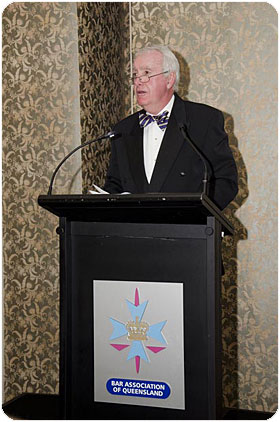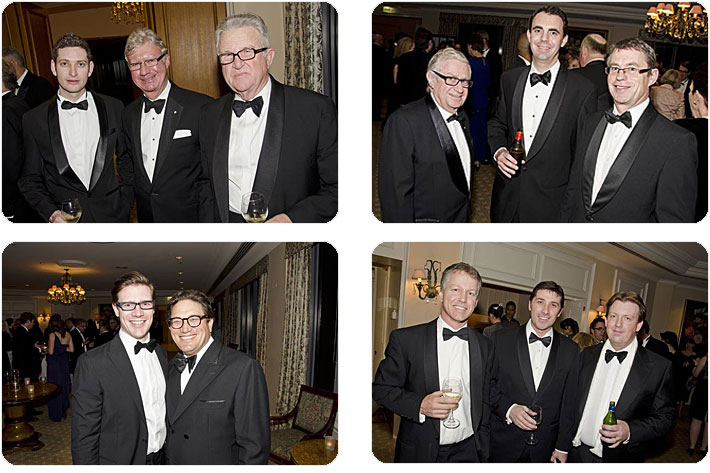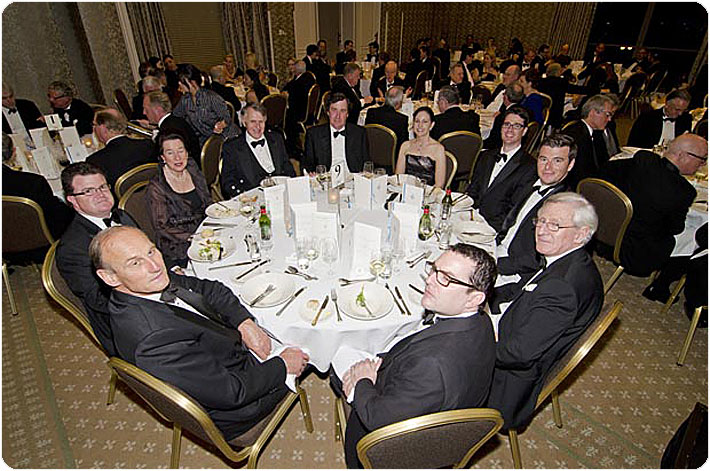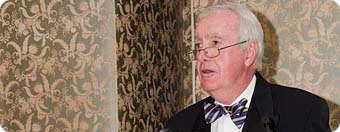Issue 52: Oct 2011, Speeches and Legal Articles of Interest
Mr Hughes, Mr Douglas President of the Bar Association, your Honours, ladies and gentlemen. Before responding to the toast proposed so eloquently by Mr Hughes may I express my thanks to the President and the Bar Council for their invitation to address this important occasion in the life of the Bar, and the bench. I am conscious of the honour you confer on me.
 The judges are, of course, indebted to Mr Hughes for his good natured toast and for the confidence, which I think he has expressed, in our capacity to perform our arduous duty. We judges are human. Part of our human frailty is to enjoy flattery and Mr Hughes is practised in those arts. He may indeed have learned something from Justice White’s address last year.
The judges are, of course, indebted to Mr Hughes for his good natured toast and for the confidence, which I think he has expressed, in our capacity to perform our arduous duty. We judges are human. Part of our human frailty is to enjoy flattery and Mr Hughes is practised in those arts. He may indeed have learned something from Justice White’s address last year.
I enjoyed listening to Mr Hughes, but as I listened I began to wonder why he bothered. I mean by that I wondered why the Bar continues with this venerable tradition of inviting judges to its convocation of collegiality, when judges as a class are becoming irrelevant to the manner in which most of you now practice your profession.
I do not wish to sound ungracious, nor to doubt the sincerity of the invitation you extend to Her Majesty’s judges. We all appreciate being among you and experiencing the conviviality of the Bar. But why do you ask us?
We are all familiar with the concept of the vanishing trial. An inevitable consequence of that phenomenon is the vanishing judge. We are disappearing behind notices of claim, statutory exhortations to settle early and often, pre-trial procedures designed to prevent actions coming on for trial, single expert reports and practice directions now so numerous and complex that there will shortly be a need for a practice direction about how to comply with practice directions. The manifest purpose of these measures is to ensure that the investigation of fact and law which used to occur at a trial now occurs before a claim can be issued so that the sense of catharsis and satisfaction counsel used to feel at the conclusion of a successful cross-examination, or a triumphant address which has brought a sceptical judge to the point of persuasion, now comes with the filing of the claim.
So I repeat the question I posed earlier: why do you persist with the toast to the judiciary?
I have not mentioned the phenomenon of mediation which is perhaps the single most important cause in the decline of the trial. I do not criticise mediation or mediators. How could I? My very great friend Ian Hanger is among us. I simply make the point that as mediation flourishes litigation withers. But mediation may provide an answer to my question. Mediation needs judges. If judges entirely vanished you would have to invent us. We are needed, as the Bastille was needed, as a symbolic source of dread against which to revolt. Without the threat that judges exist, and might actually try a case, mediations would fail.
I believe I know how they work. The mediator’s opening gambit is to ask each of the parties how much they have spent to date. The figures are given, added up, and then rounded up to the next highest $100,000, or perhaps the one after that. A look of polite surprise comes to the mediator’s face as he says “judges are expensive, aren’t they?”
If that does not work you say worse things about us. You put us into categories, and say to the parties that if the case is not settled it will be tried by a judge (a) from whom they will never get a judgment; or (b) from whom they will get a judgment, but the wrong one; or (c), from a judge who will give the right judgment but at such high personal cost that the health of counsel and client may not recover for a year.
If any of my judicial colleagues present is uncertain of the category into which you have been put, I suggest you turn to the barrister nearest to you, and ask.
 There may be another reason why you drink our health. It may be that you are profoundly grateful that we are not worse than we are. Bye and large the judges before whom you appear are competent and conscientious. There is much to be said for that accomplishment. It is not hard to find in times and places not far removed examples of very bad judges.
There may be another reason why you drink our health. It may be that you are profoundly grateful that we are not worse than we are. Bye and large the judges before whom you appear are competent and conscientious. There is much to be said for that accomplishment. It is not hard to find in times and places not far removed examples of very bad judges.
When the commercial list was re-established seven or eight years ago John Muir and I were called upon to address professional gatherings to explain the reasons for its establishment and how it would function. In my set address I used to refer to the establishment of the Commercial Court in England in 1895 which came about as a consequence of a series of judgments in commercial cases in which judges had performed very badly. The last straw was a judgment by Mr Justice Lawrance which overlooked half the issues in the case and misunderstood the other half. Lord Justice MacKinnon once said of him:
“He was a stupid man, a very ill equipped lawyer, and a bad judge. He was not the worst judge I have ever appeared before: that distinction I would assign to Mr Justice Ridley; Ridley had much better brains than Lawrance, but he had a perverse instinct for unfairness that Lawrance could never approach.”
But bad judges are not to be found only in the English past. Judge Gielor of California was removed from office less than 40 years ago. He was described as “a man of a rumbustuous personality, sometimes given to sexual harassment.” Once in chambers the judge thrust a battery operated dildo into a public defender’s buttocks. The result was so satisfactory from the judge’s point of view that he took the device to court and used it to truncate cross-examination.
The same public defender was about to ask a question when judge Gielor said to his clerk:
“Get the machine out”. The clerk asked “the battery?” The judge replied “the battery”.
There were no further questions.
Encouraged by this success the judge tried again. A subsequent cross-examination was interrupted in similar circumstances. This was the exchange:
Judge to clerk — “Did you get those batteries?”
Clerk- “I’m charging it up. I’ve got a bigger one. 15 volts.”
Judge to counsel — “David, we’ve got a 15 volter in there now.”
Clerk — “With a longer handle.”
Judge — “Hurry, David. We’ve got a 15 volt battery for you.”
Counsel — “I have no further questions.”
You may well think that it is worth toasting a judiciary that does not include a Lawrence, a Ridley or a Gielor.
Another reason may be that all judges today are polite. That is an improvement on the past but judicial politeness can be overrated. It can become a form of cruelty. Let me give you an example. Mr Justice Graham was a judge of the early 19th Century. He was said, perhaps uniquely for his time, to be exquisitely courteous in dealing with prisoners. On one occasion at the Old Bailey he had to pronounce sentences of death on 16 hapless petty thieves. He overlooked one and only sentenced 15. The jailer pointed out the omission and Graham called the man who had been spared back to the dock. He addressed him apologetically:
“I find I have accidentally omitted your name in my list of prisoners doomed to execution. It was quite accidental, I assure you. I ask your pardon for my mistake. I am very sorry and all I can add is that you will be hanged with the rest.”
I wish to end on a serious note. There is no need to search, earnestly or facetiously, for a reason why the Bar should toast the judiciary, and why we should respond with our own expressions of affection and respect for the bar. We are all engaged in a serious and important endeavour, the seriousness and importance of which is often overlooked in our preoccupations with daily routine. We all seek the betterment of society by seeing that justice is done to all who come to the law for its protection, or for vindication. Whatever the dispute, whatever the court, a resolution according to law by peaceful and civilised means is a social good the value of which should not be underestimated. There was a time in the early history of this country when the courts were the only organ of good government. There are still instances when courts must stand against the tides of public and even Parliamentary rage. They could not and cannot perform that role, or their ordinary one, without the independence and integrity of the bar. Our functions are complimentary and interdependent. I thank Mr Hughes who on your behalf has given your commitment to this endeavour, and on behalf of the judges, I reciprocate.





 The judges are, of course, indebted to Mr Hughes for his good natured toast and for the confidence, which I think he has expressed, in our capacity to perform our arduous duty. We judges are human. Part of our human frailty is to enjoy flattery and Mr Hughes is practised in those arts. He may indeed have learned something from Justice White’s address last year.
The judges are, of course, indebted to Mr Hughes for his good natured toast and for the confidence, which I think he has expressed, in our capacity to perform our arduous duty. We judges are human. Part of our human frailty is to enjoy flattery and Mr Hughes is practised in those arts. He may indeed have learned something from Justice White’s address last year. There may be another reason why you drink our health. It may be that you are profoundly grateful that we are not worse than we are. Bye and large the judges before whom you appear are competent and conscientious. There is much to be said for that accomplishment. It is not hard to find in times and places not far removed examples of very bad judges.
There may be another reason why you drink our health. It may be that you are profoundly grateful that we are not worse than we are. Bye and large the judges before whom you appear are competent and conscientious. There is much to be said for that accomplishment. It is not hard to find in times and places not far removed examples of very bad judges. 